Transferts monétaires et mobilité humaine
Les transferts monétaires sont souvent utilisés lors de crises afin de répondre aux besoins des personnes migrantes. Dans cette page, vous trouverez des ressources sur les transferts monétaires et la migration.

La Croix-Rouge se prépare à fournir une aide humanitaire aux migrant·es de la caravane sur le point de quitter le Honduras pour le Guatemala.
©Johannes Chinchilla / FICR.
Conflits, crises économiques et catastrophes sont autant de raisons ayant contraint des personnes à fuir et à traverser des frontières dans des conditions éprouvantes et risquées, en quête de sécurité et de moyens de subsistance. En 2020, le nombre de personnes déplacées de force s’est envolé au niveau sans précédent de plus de 80 millions de personnes, soit près du double du nombre enregistré il y a une dizaine d’année. Cette tendance s’aggrave et les effets du changement climatique menacent de déplacer jusqu’à 200 millions de personnes d’ici 2050.
L’assistance monétaire est de plus en plus utilisée afin de répondre aux besoins des personnes en situation de déplacement. On y a eu recours à grande échelle dans différents contextes de migration, en Europe en 2015 jusqu’au Venezuela pour « los caminantes ». Elle a également été utilisée dans d’autres crises migratoires, notamment en Amérique centrale, au Sahel, en Méditerranée et dans la Corne de l’Afrique. L’assistance monétaire est à l’heure actuelle l’une des principales formes d’aide apportée aux populations déplacées en Ukraine et dans les pays voisins.
Il existe une myriade de perspectives et de définitions concernant le mot « migrant·e » et la façon dont les humanitaires doivent agir. C’est pourquoi nous ne choisissons pas une définition unique pour le moment, étant donné que les discussions sur l’assistance monétaire et la migration en sont encore à leurs prémices et que le langage évolue encore.
Documenter et partager les données probantes donnera lieu à des interventions plus efficaces. Cette page contient une sélection de ressources utiles concernant la migration et le recours à l’assistance monétaire. Elle sera mise à jour au fil des discussions ayant lieu dans les espaces humanitaires des transferts monétaires.
Priorités actuelles
Afin de contribuer aux progrès relatifs à cet enjeu, nous nous engageons à :
- soutenir la création de données probantes aux niveaux régional et mondial ;
- contribuer aux solutions pratiques visant à mettre en œuvre les transferts monétaires auprès des personnes migrantes ;
- organiser des discussions sur les enjeux majeurs basées sur des données probantes.
Contenu récent

Briser les mythes et s’attaquer aux préjugés contre les transferts monétaires dans la région dans le contexte de la COVID
Guides et outils
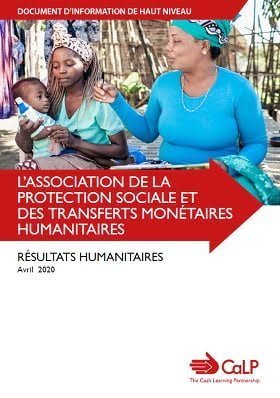
L’association de la protection sociale et ses transferts monétaires humanitaires
Rapport
De plus en plus de voix s’élèvent pour affirmer la nécessité de renforcer les liens entre la protection sociale et les transferts monétaires humanitaires. Les travaux à ce sujet sont également de plus en plus nombreux. Ce document d’information conçu pour le CALP Network s’appuie sur une...

COVID-19 & Urgent Need for Child-Sensitive Social Protection
Policy paper
The COVID-19 pandemic is negatively affecting children’s lives in a myriad of ways. Well-intentioned government containment and response efforts such as movement restrictions and school closures have disrupted education for more than 1.5 billion students, leaving some of the most vulnerable children...

COVID-19: Invest now in cash/voucher-social protection scale-up or children pay the price later
Report
Read the article here. Only socially accountable Social Protection Assistance beyond humanitarian cash/voucher programmes – if properly and quickly implemented – will protect generations of children from the aftershocks of COVID-19. Despite cash and voucher transfers becoming the tool of choice of...

Collaborative Cash Delivery Network – Grand Bargain – Collaboration Agreement Accomplishments 2020
Report
The Collaborative Cash Delivery (CCD) Network is pleased to present its achievements against the commitments made by our global members’ CEOs at the 2019 Grand Bargain Summit as part of our global collaboration agreement. We know we are better together, and in this time of increasing pressure on the...

Les transferts monétaires & COVID-19 : Évaluation et suivi des marchés à distance
Blog Post
Alors que les praticiens sur le terrain adaptent leurs programmes au Covid-19, des collègues parmi nos membres et Groupes de Travail sur les Transferts Monétaires identifient un grand nombre de défis. L’objectif de cette série de vidéos conçues est de partager les stratégies pratiques et les...

Global Remittances to Suffer a Blow From COVID-19
Blog Post
The CALP Network’s Future of Financial Assistance report highlighted the importance for CVA actors of working with and alongside other financial flows, which often dwarf volumes of humanitarian aid in crisis contexts. Of these flows, remittances are a critical lifeline for many crisis-affected...

Why use cash transfers to respond to COVID-19?
Guidelines and Tools
It is a one pager document showing advantages of using cash transfers in COVID-19 response together with some examples of integrating cash with different sectors.
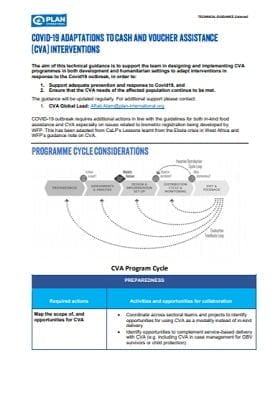
COVID-19 Adaptation to Cash and Voucher Assistance (CVA) Intervention
Guidelines and Tools
The aim of this technical guidance is to support the team in designing and implementing CVA programmes in both development and humanitarian settings to adapt interventions in response to the Covid19 outbreak, in order to:
1. Support adequate prevention and response to Covid19, and
2. Ensure that the CVA...
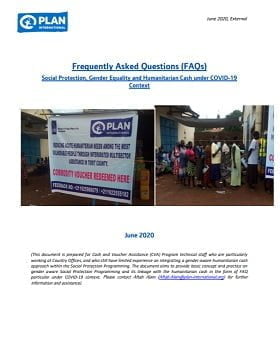
Frequently Asked Questions (FAQs) Social Protection, Gender Equality and Humanitarian Cash under COVID-19 Context
Guidelines and Tools
This document is prepared for Cash and Voucher Assistance (CVA) Program technical staff who are particularly working at Country Offices, and who still have limited experience on integrating a gender aware humanitarian cash approach within the Social Protection Programming. The document aims to provide...
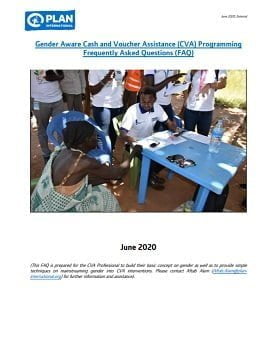
Gender Aware Cash and Voucher Assistance (CVA) Programming Frequently Asked Questions (FAQ)
Guidelines and Tools
This FAQ is prepared for the CVA Professional to build their basic concept on gender as well as to provide simple techniques on mainstreaming gender into CVA interventions. Please contact Aftab Alam (Aftab.Alam@plan-international.org) for further information and assistance.

Frequently Asked Questions (FAQ) COVID-19 and Gender Aware Cash and Voucher Assistance (CVA) Programming
Policy paper
This FAQ is prepared for the CVA professional to build their technical capacity in relation to use of cash and voucher transfers across the sectors particularly under COVID-19 response.

Migrating with dignity: MPCA to Venezuelan families in Peru
Video
Watch the video here In 2018, with the support of OFDA and FFP, Save the Children implemented a multi-purpose cash transfer ‘Plus’ program in response to the influx of Venezuelan into Peru. The program aimed at covering vulnerable household’s basic needs and prevent them from resorting to negative...

Migrating with dignity: MPCA to Venezuelan families in Peru
Blog Post
Watch the video here In 2018, with the support of OFDA and FFP, Save the Children implemented a multi-purpose cash transfer ‘Plus’ program in response to the influx of Venezuelan into Peru. The program aimed at covering vulnerable household’s basic needs and prevent them from resorting to negative...

MPCA ‘Plus’ assistance to people on the move: the case of Venezuelans in Peru
Video
Watch the video here This video documents the MPCA ‘Plus’ program implemented by Save the Children Peru in response to the Venezuelan crisis, and more specifically highlights the provision of assistance to families on the move, or ‘transiting’ through Peru. Beneficiaries were identified throughout...

MPCA ‘Plus’ assistance to people on the move: the case of Venezuelans in Peru
Blog Post
Watch the video here This video documents the MPCA ‘Plus’ program implemented by Save the Children Peru in response to the Venezuelan crisis, and more specifically highlights the provision of assistance to families on the move, or ‘transiting’ through Peru. Beneficiaries were identified throughout...
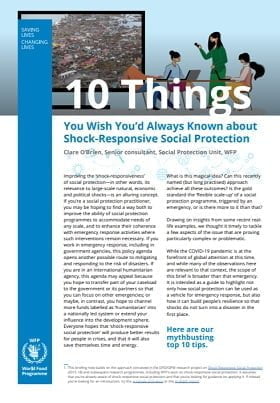
10 Things you Wish you’d Always Known About Shock-responsive Social Protection
Guidelines and Tools
Download the publication file and the one-page summary here Improving the ‘shock-responsiveness’ of social protection—in other words, its relevance to large-scale natural, economic and political shocks—is an appealing prospect both for governments and for their partners working in social...
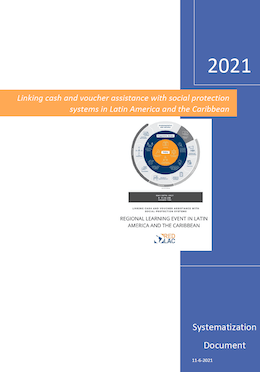
Systematization document regional learning event: Linking cash and voucher assistance with social protection systems
Report
The purpose of this document is to systematize the process of organizing the Regional Learning Event on “Linking Cash and Voucher Assistance with Social Protection Systems”, convened by REDLAC and the Regional Cash Working Group -R4V for May 20th, 2021.
The Grand Bargain’s Working Cash Workstream,...

CVA for COVID-19: Listen to people and act on what they say
Blog Post
Not everyone will be personally affected by the COVID-19 health crisis, but nearly every household will feel its effects economically. For many people in humanitarian crises, particularly those at the margins of society, the economic impact of COVID-19 will be greater and longer-lasting than the health...
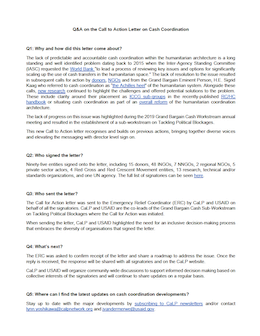
Q&A on the Call to Action Letter on Cash Coordination
Report